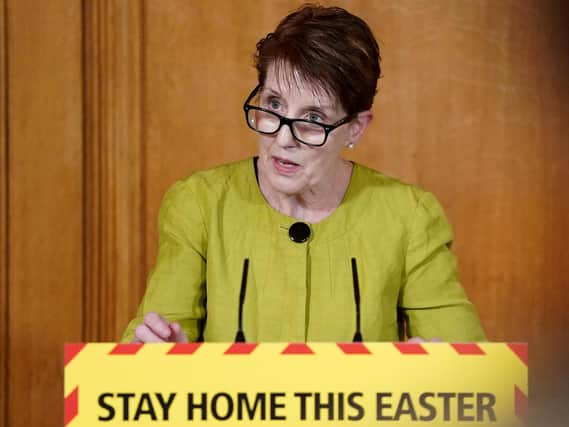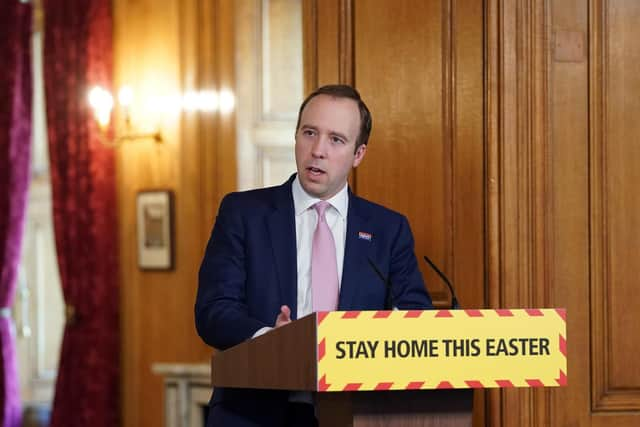Coronavirus hospital admissions in Yorkshire rise as UK death toll hits 10,000


Health Secretary Matt Hancock said it was a “sombre day” as the toll reached the 10,612 marker for deaths in hospital across the UK.
And Public Health England Medical Director Professor Yvonne Doyle warned that while the number of people in hospital with coronavirus in London was stabilising, Yorkshire and the North East was a particular area where pressure was building.
Advertisement
Hide AdAdvertisement
Hide AdSpeaking at the daily press briefing in 10 Downing Street, Prof Doyle said: “We can begin to see London stabilising.


“But on the other hand for Great Britain we start to see other areas increasing, particularly the North West and Yorkshire.
“It’s very important that the message about staying home and social distancing is adhered to because we are certainly not past this crisis’ damage yet.”
Some 60 of those included in the latest figure for deaths were in Yorkshire, the largest daily total for the region since the crisis began, bringing the total to 672.
Advertisement
Hide AdAdvertisement
Hide AdIt came as experts warned the UK could face the worst coronavirus death rates in Europe.
Sir Jeremy Farrar, director of research charity the Wellcome Trust and a member of the the Scientific Advisory Group (Sage) which advises the Government today said: “Numbers in the UK have continued to go up and yes, the UK is likely to be certainly one of the worst, if not the worst affected country in Europe.”
Speaking to the Andrew Marr Show he said continuing testing in the community - which the UK is not currently doing - would “buy you time” to deal with the crisis, giving an additional six to eight weeks to ensure health systems were up to capacity.
“Undoubtedly there are lessons to learn from that,” Sir Jeremy said.
Advertisement
Hide AdAdvertisement
Hide AdHis comments were echoed by Professor Sir David Spiegelhalter, chairman of the Winton Centre for Risk and Evidence Communication, at the University of Cambridge.
He said: “Although reporting delays make it difficult to track the epidemic with confidence, we appear to be following a slightly worse trajectory than Italy and it is plausible that we might end up with the most in-hospital Covid deaths in Europe.”
But the University of Nottingham’s Keith Neal, emeritus professor in the epidemiology of infectious diseases, said this could be just because the country’s population is so big.
He said: “It is likely that the UK will have one of the largest number of total deaths solely because we the second largest population in western Europe and EU countries, only Germany has a larger population.
Advertisement
Hide AdAdvertisement
Hide Ad“The important figure is the death rate per million and the total number of deaths.
“On this count Belgium seems to be heading for a serious problem like Italy and Spain.”
The Health Secretary refused to refute the claims when questioned by journalists, instead insisting: “I think that sort of comment merely reinforces the importance of the central message which is that people should stay at home because that protects the NHS and saves lives.
“The future of this virus is unknowable as yet because it depends on the behaviour of millions of people and the Great British public.”
Advertisement
Hide AdAdvertisement
Hide AdMr Hancock was also asked whether 20,000 deaths in the UK would still be considered a “good outcome”, as claimed by Chief Scientific Adviser Sir Patrick Vallance last month.
However he was unable to answer.
He instead said: “Predictions are not possible precisely because they depend on the behaviour of the British people and I’m really glad that at the moment the British people this weekend are doing their bit.”
Mr Hancock also denied the Government had been too slow to stockpile personal protective equipment (PPE) earlier in the coronavirus outbreak, and joined colleagues Home Secretary Priti Patel and Business Secretary Alok Sharma in declining to apologise to health and social care staff for the shortages they were facing.
When asked whether he would say sorry to nurses forced to choose between treating coronavirus patients or protecting themselves due to shortages, after warning from the Royal College of Nurses, he did not answer directly, but said: “We are working night and day to make sure that we get the right PPE.
Advertisement
Hide AdAdvertisement
Hide Ad“And actually the thing I want to do is pay tribute to the unbelievable efforts of a huge number of people to get to the position we are in now.”
When asked if the Government could commit to a date to deliver more PPE, Mr Hancock said: “It’s impossible because the quest is to get the right PPE to the right people on the front line at the right time across many millions of people across the NHS and social care.”
Asked about the timescale of providing tests for staff in care homes Mr Hancock said that measures were being taken but that the process was “nuanced and complicated”.
He said: “I’m constantly trying to get more support for them (care homes) is the honest truth.”
Advertisement
Hide AdAdvertisement
Hide AdMr Hancock also said he did not have any update on how many NHS staff had died following the 19 he confirmed on Saturday.
But he said the circumstances around every death will be investigated to discover how they caught the virus.